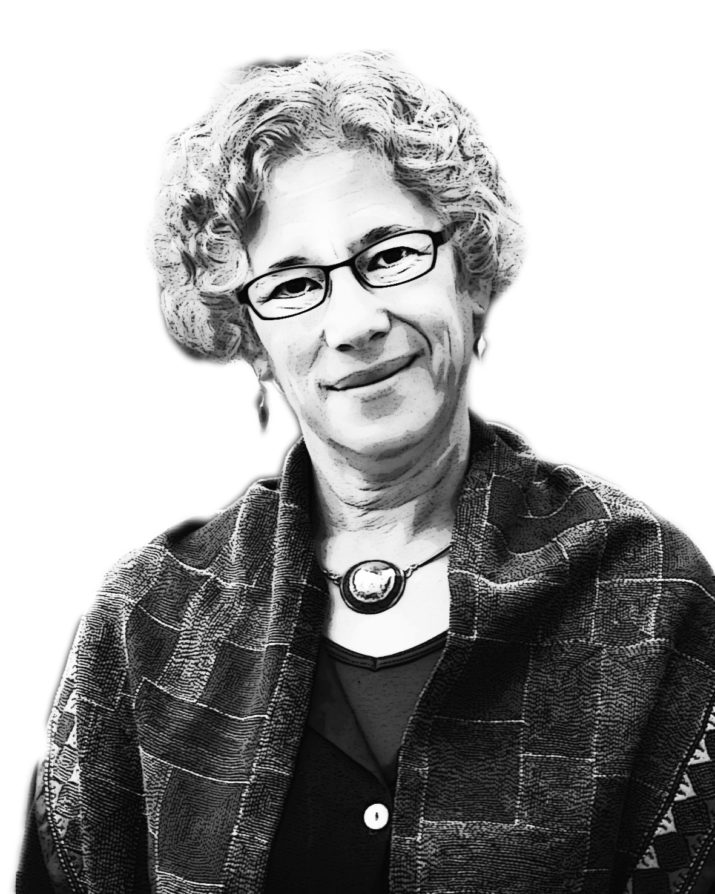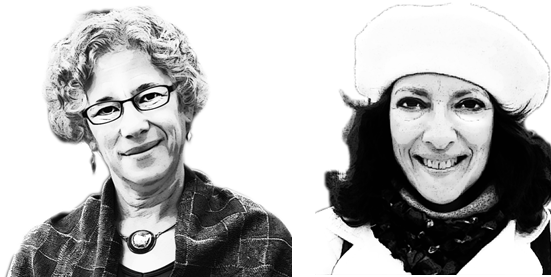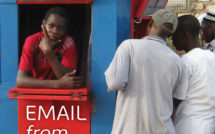

This is part of our special feature, Beyond Eurafrica: Encounters in a Globalized World.
The lives, status, and images of immigrants may constitute the single-most urgent human issue of our time. As American anthropologists studying African diasporas in Europe (and beyond), we recently had a conversation about the work we’re doing with the new African migrant stream.
—Pamela Feldman-Savelsberg and Alma Gottlieb for EuropeNow.
PFS It strikes me that, over the longue durée, and despite their inevitable idiosyncrasies, our careers share at least three major themes. We’ve both switched fieldsites, we’re both Africanist anthropologists who did long-term research on the African continent before studying African diasporas in Europe (as well as North America), and we both branched out from Francophone communities to using other European languages (Portuguese for you and German for me, as well as our native English)—implying other European entanglements with the African continent and its peoples.
AG Yes, and perhaps these aren’t coincidences—we may embody some generational shifts! But before we get to that—your early research focused on the lives of women in Cameroon (1999). Your new book focuses on women who’ve left Cameroon to re-start their lives in Berlin. What inspired you—both to switch fieldsites to a new continent, and to write a book on a new subject?
PFS Each research project has opened up new questions and curiosities. Following these leads has taken me to new fieldsites within Cameroon, then Europe. Along the way, I’m not only following up on questions raised by prior research projects, I’m also following people from the same ethnic group and region—sometimes even the same people, or their friends and children—from the countryside to the city (Feldman-Savelsberg 2010), and on to Berlin or Paris.
And I’ve always been interested in women’s lives, in reproduction and family-making, and in tensions between belonging and marginalization. Thus, even though I’ve switched fieldsites, there’s a lot of continuity in my work. The transnational/migration focus is new, but in other ways, this book is not about an entirely new subject.
Even my next planned research project—about ways in which the contexts of reception matter for Cameroonians’ changing notions of transnational family obligations—continues along these lines, while bringing me to new sites: Paris and Cape Town.
What about you, Alma? Your switch from working with the Beng people in Côte d’Ivoire to Cape Verdeans in Portugal actually inspired me that switching fieldsites was not only possible but productive. It doesn’t have to erase the gains of long-term engagement with a specific locale, people, or set of issues—nor does it preclude the deep, local knowledge and contextualization that are the hallmark of anthropological methods, description, and theorizing.
AG To be honest, it took me a while to reach that conclusion. It’s difficult to leave a long-term fieldsite in which we’ve become so emotionally and professionally embedded! But ongoing civil unrest in Côte d’Ivoire prevented me from returning for many years, and in the end, I acknowledged that switching to drastically new fieldsites could be both personally meaningfully and intellectually productive (Gottlieb 2012).
My new locales involved many layers of change. I switched from working in the rain forest (of Côte d’Ivoire) to working (initially) in a major European capital city (Lisbon); from working in a single space (the Beng region of Côte d’Ivoire) to doing a multi-sited project (following the Cape Verdean diaspora across Europe, North America, and elsewhere); from working with partly self-sufficient farmers to working with urban workers fully embedded in a capitalist economy; from working with mostly non-literate villagers to working with fully literate people, including middle-class and elite folks; from working with a group with little recorded history and a shallow oral history to working with a people with a well-documented history, requiring much historical reading on my part; from working face-to-face to including online research (via e-mail, Skype, and even Facebook); from working in two languages I knew well (French, Beng) to studying new languages in mid-life (Portuguese, Cape Verdean Crioulo, and eventually, I hope, some Hebrew); and from working with a group deeply embedded in a local religious tradition outside the scope of the major “world religions,” to working with a group deeply embedded in the Judeo-Christian tradition.
While these shifts were certainly demanding, they’ve also proven exhilarating, allowing me to engage with contemporary issues and challenge plenty of stereotypes—as I know you’ve done through your German research. Western media images of migrants and refugees have tended to focus on the poorest of the poor—those in desperate conditions, in need of serious outlays of both aid and sympathy. The West African migrants you profile in your new book are mostly highly educated and middle-class. Did you focus on this group of semi-invisible migrants precisely in order to challenge stereotypes? What lessons can they teach Western readers?
PFS While I didn’t plan to focus on the middle class, I do aim to challenge stereotypes. I tell one among many possible stories about African migration and family-making in Europe. Other important stories have been told about migration and the search for well-being. I fear that some of these narratives end up reinforcing stereotypes of “the African migrant” as illegal(ized), impoverished, and in need of help.
What about your own experience with class difference? Has that changed for you with your new work with Cabo Verdeans in Europe and the U.S.?
AG In fact, religious history loosely shapes class distinctions in Cabo Verde. Many Cabo Verdeans who are aware of their Jewish ancestry belong to the middle-class, or sometimes to the elite. So, as with your work among Cameroonian migrants in Germany, discussing this slice of African migration instantly serves as a stereotype-buster.
PFS You’re so right! In dialogue with my Cameroonian interlocutors and colleagues, I became aware of the pain caused by the repetition of a one-sided story of abjection. Stereotypes hurt. However well-meaning, fundraising campaigns portraying poor, helpless African women and children belie the energy, intelligence, and educational resources of Cameroonian immigrant women. Without sugarcoating the hardships of migration, it’s important to inform readers that the story of abjection does not fit the data for Cameroonian immigrants to Berlin.
There are enormous distinctions in women’s lives—and in the lives of my Cameroonian interlocutors. Their experiences vary, depending not only on class background and class attainment, but also immigration status upon entering the new country, as well as the ability (or lack thereof) to maintain or obtain regularized immigration status. These critical distinctions often lead to vastly differing reproductive strategies, which in turn are linked to different ways that women seek a sense of belonging in multiple communities (Feldman-Savelsberg 2016a).
As anthropologists we look for both patterns and particularities. The former are important for telling a coherent, social-scientific story; the multiple stories of particular individuals’ lives are important to work against typification, which is by definition reductionist.
You also seem to be telling some very atypical stories about the group you are studying, Alma. Are there other stereotypes you are seeking to challenge about the “typical [African] migrant”?
AG Yes, many! Here’s an obvious one: as an Africanist, I was amazed to discover the longstanding Jewish presence on the continent. When I first started reading the history of Cabo Verde, that glaring omission in my training really shocked me. And if I, as a Jew and an Africanist, had little knowledge of that history, how likely was it that others knew of this connection? Bringing Jewish studies and African studies into a long-overdue conversation is certainly one of my scholarly aims with this project (Gottlieb 2015/2016a, 2018b). In fact, the time for such a conversation seems to have arrived, and I’m delighted to join the work being done by quite a few others (e.g., Bruder and Brettschneider 2018; Miles and Devir 2018). Moreover, chronicling the crossed diasporas linking Jews and Cabo Verdeans has proven a powerful way to “deconstruct the Other.” In this disturbing moment of increasing racism in the US and Europe, it’s ever more critical for us to recognize our shared humanity.
Your book details examples of daily racism that Cameroonian immigrants experience in Berlin… yet, new Cameroonian migrants continue arriving. In the wake of Germany’s role in WWII aiming to annihilate Jews, Roma, gays, and other groups of people that white Germans dubbed “Others,” how do you explain the decisions of these African elites to emigrate, of all places, to Germany?
PFS There are many reasons that Cameroonian migrants—and as we know from the news, many, many others—choose to emigrate to Germany. Economics is primary—because of the country’s strong economy and job opportunities. Especially important to upwardly-mobile Cameroonians is Germany’s almost-free university education.
And, interestingly, many Cameroonians appreciate the fact that it is not France. Cameroonian migrants in both Germany and France—and, as I learned last summer, those who remain home in Cameroon—perceive that immigration bureaucracy works more reliably and predictably in Germany than it does in France. Even if the UN, in its Decade for People of African Descent, finds significant structural racism in Germany, native-born Germans hold a variety of political and ideological positions. Thus, despite the catastrophic history of racism in their country, some Germans are more aware of inherent racism, and eager to discuss it, than are their counterparts in countries with less tainted histories (Feldman-Savelsberg 2015). And, for all its faults (past and present), Germany is certainly more welcoming to refugees than is the U.S. in the current Trump era.
AG Cabo Verdeans have sometimes made similar assessments in choosing a European country as their destination. Of course, those who are the poorest typically lack flexibility in making choices. I remember some folks telling me about an Italian priest who recruited impoverished Cabo Verdean young women to Italy some years ago—they grabbed it as their only chance for escaping poverty, even though they didn’t know the language or have any ties to Italy. Others with more resources (financial, educational, familial… ) may have the luxury to research the current climate of this or that European country for tolerance vs. racism vis-à-vis immigrants of color, as well as schooling and job opportunities. Quite a few Cabo Verdeans have chosen Rotterdam, for example, where they perceive both less racism and more employment opportunities than in some other European countries; others have chosen France for reasons ranging from linguistic comfort to generous medical insurance.
All this is rather new, though. During the 50 years of Salazar’s dictatorship (when Cabo Verde remained a Portuguese colony), few people had the means to leave the islands; those who did were mostly elites headed to Portugal for education or jobs. (Some also went to the US during years when immigration quotas didn’t restrict their entry.) After Cabo Verde gained independence in 1975, many residents left the islands in search of better opportunities elsewhere, including Portugal. Depending on several factors—especially class and educational level—they found varying levels of welcome or racist exclusion. One elderly Cabo-Verdean man now living in Massachusetts told me:
Many . . . military Portuguese . . . went to the Cape Verde islands . . . with stereotypes in their minds. . . they were going to drag sticks under their arms so that they could meet those natives, and they were going to come and use the whip . . . they . . . [had left Portugal] with the idea that they were saying Goodbye to their families because they’re going to a place where they had wild animals.
From these and other encounters, Cabo Verdeans had a good sense of the racist attitudes that might greet them in Portugal. Even so, after independence from Portugal, many left for Lisbon in search of a better life. The same Cabo Verdean-American also told me, “When independence came about, everybody wanted to find a link with Portugal so they could go back there… You didn’t need anything special to go to Portugal, you just got on the ship and went.”
To me, these comments signaled a complicated relationship that colonial-era Cabo Verdeans had to their colonial metropole. That multi-layered relationship probably continues today among many residents from the global South who migrate to the land of their former colonial power, whether that be Indians in London, Guineans in Lisbon, Senegalese in Paris, or Eritreans in Rome. At the same time, we know that migrating to a country other than the former colonial power presents its own tremendous challenges—especially linguistic ones. But it also offers new opportunities for forging relations with Europeans that aren’t directly shaped by the sorts of tragic master-slave narratives that Fanon (2004/1961) and Memmi (1991/1957) documented long ago.
Are these themes you’ve observed with Cameroonians in Germany?
PFS The common question posed often by Germans to immigrants in daily life—“Where do you come from?”—haunts Cameroonian parents and their children in Germany, as does the general image of “Africa” that is portrayed in mass media (Feldman-Savelsberg 2011a, 2011b). One Cameroonian mother told me a poignant story about her seven-year-old son’s visit to Cameroon. “This isn’t Africa, mom,” he exclaimed. There were no lions or giraffes, not even a little monkey in the big port city of Douala. Instead, while visiting his urban cousins, he experienced air-conditioned office buildings with elevators, manicured gardens, and schoolchildren in neatly pressed uniforms. None of this fit with the image of game parks and starving, half-naked children that the boy had learned about from German television.
This story gets back to your earlier comment on recognizing our common humanity—that certainly is behind our efforts to link European studies and African studies, and to challenge the stereotype that migration only runs from south to north.
AG Absolutely! Linking European studies and African studies, along the lines of what this special issue aims to accomplish, is another component of what we Africanists are discovering these days—put simply, that “Africans” exceed “Africa.”
The assumption that migration runs once and for all, and in a single direction, still dominates much thinking nowadays. Working with Cabo Verdeans in the global diaspora, I’ve come to appreciate how limited that model is. With Cabo Verdeans, migration isn’t even just bi-directional, it’s multi-directional. I’ve met SO many Cabo Verdeans who’ve lived for significant numbers of years in multiple countries on multiple continents. Within Africa, that often includes Cabo Verde, Angola, Mozambique, Guinea-Bissau, Senegal, and Côte d’Ivoire. Within Europe, migrants may move between Portugal, France, Italy, the Netherlands, and the U.K. In the Americas, Cabo Verdean migrants also have not only the U.S. but also Brazil, Argentina, and elsewhere as destinations. And, often, many migrants move back and forth between many of these places, depending on job prospects, family ties, legal issues, and other biographical factors. Some elders end up returning to Cabo Verde when they retire. Perhaps even more intriguingly, some young, U.S.-born Cabo Verdean-Americans I’ve met are deciding to “reverse-migrate” to Cabo Verde on a permanent basis after discovering unexpected charms in the homeland of their parents or grandparents. This multi-directional, on-the-go diaspora tells such a different story from the usual narrative of leaving one homeland (the global South) to relocate permanently in another one (in the global North). In that sense, the scholarly practice of focusing on a region or continent seems hopelessly outdated, in this globalizing age of peripatetic lives.
PFS Yes—while looking at “Africa-in-Europe” is important, to understand Africans in Europe, we really need to think globally.
AG My Cabo Verdean friends and interlocutors would certainly say so. With the Cabo Verdean diaspora being global, focusing on, say, Cabo Verdeans in Lisbon (as I did for one year) or Rotterdam or London doesn’t make sense. For example, of all the Cabo Verdeans I met while in Portugal, I found that 100% had relatives in New England, and attending to those trans-Atlantic ties is now a part of my research. In fact, in this age of “social media,” many of these globally dispersed families are re-discovering—or newly discovering—each other online. I’ve lost count of the Facebook pages I’ve come across that link Cape Verdean families, or those from an island or a neighborhood—or even those with shared DNA—with other diasporic Cabo Verdeans around the globe.
PFS Even though the extent and the length of their migration history differs, the vast majority of Cameroonians I came to know in Berlin and Paris had at least one if not several relatives in other parts of Europe, in the US and Canada, and a few in China, Russia, and the Gulf States. From conversations with their globally dispersed family members, Cameroonians vividly characterized various diasporic destinations and what it was like to raise kids there. And it’s not just talk—we’ve both heard people comment on how they received this package of medicines or that phone call from relatives in either X or Y. I get the feeling that this is even more important in the Cape Verdean diaspora that sees itself as a global diaspora.
AG Yes, to artificially isolate the study of, say, Cape Verdeans in Europe—for example, from the perspective of “Eurafrica”—just doesn’t make sense ethnographically. I understand why the notion of “Eurafrica” is a powerful corrective to those hard boundaries between “Europe” and “Africa” that are so rooted in racist geographies. Yet, this very concept also, inadvertently, replicates other boundaries that are equally problematic, given the global reach of today’s African diasporas. Although Cape Verdeans–who see themselves as part of a single, global diaspora–may be a bit of an extreme, I dare say that other groups likewise resist continental boundaries in thinking about their diasporic travels. Wolof men who now fly to and trade regularly between Dakar, Paris, Turin, New York, and Guangzhou (while remaining married to women remaining in Senegal) also come to mind (cf. Hannaford 2017). These new globalized African diasporas are surely pushing us old-fashioned scholars to rethink our continental and disciplinary boundaries.
PFS This has been a great conversation, Alma. In an earlier dialogue, we also discussed how we use narrative in our work; we talked about how the concepts of affective circuits and belonging can illuminate the situation of migrants across Europe; and we spoke, perhaps a bit ambitiously, about the implications that the intimate work that anthropologists do with migrants holds for public policy concerning migration. I’d like to invite EuropeNow readers to read that conversation on your blog here.
Pamela Feldman-Savelsberg has been researching the lives of Cameroonians in Berlin since 2009, in Paris since 2015; her comparative work will soon take her to Cape Town (South Africa). In a new book profiling Cameroonian mothers now living in Berlin—Mothers on the Move: Reproducing Belonging between Africa and Europe (2016b, 2016c)—Feldman-Savelsberg challenges much of what many in the Global North thought they knew about immigrants.
Alma Gottlieb has been researching the lives of Cape Verdeans in Europe (especially Portugal) and the U.S. (especially the New England region) since 2006, with a focus on unexpected Afro-Jewish entanglements. She has published several articles from this project (2012, 2015/2016, 2018a, 2018b) and is completing work on a book, tentatively titled Africa across the Seder Table: Jewish Identity in the Cape Verdean Diaspora (n.d.).
Published on March 1, 2018.
References
Brettschneider, Mari, Edith Bruder, and Magdel LeRoux, eds.
2018 African Journeys to Judaism. Cambridge, UK: Cambridge Scholars Publishing. In press.Fanon, Franz
2004 [1961]. The Wretched of the Earth. (2004) [1961]. The Wretched of the Earth. Translated by Philcox, Richard. New York: Grove Press.
Feldman-Savelsberg, Pamela
1999 Plundered Kitchens, Empty Wombs: Threatened Reproduction and Identity in the Cameroon Grassfields. Ann Arbor: University of Michigan Press.
2011 “Kindererziehung in der Diaspora” [Childrearing in the Diaspora]. LoNam: das afrikanische Magazin 7(1) (Feb-Mar 2011):7.
2011 „Kindererziehung in der Diaspora II“ [Childrearing in the Diaspora II]. LoNam: das afrikanische Magazin 7(2) (Apr-May 2011):8.
2015 “Mothers on the Move: Mobility and Intensive Care Work among Cameroonian Migrants to Germany.” Pp. 207-230. In: Anthropological Perspectives on Care: Work, Kinship and the Life Course, ed. Erdmute Alber and Heike Drotbohm. London: Palgrave.
2016a “Forging Belonging through Children in the Berlin Cameroonian Diaspora.” In: Affective Circuits: African Migrations to Europe and the Pursuit of Social Regeneration, ed. Jennifer Cole and Christian Groes-Green. Pp. 54-77. Chicago: University of Chicago Press.
2016b Migranten, Recht, und Identität: Afrikanische Mütter und das Ringen um Zugehörigkeit in Berlin. Bielefeld: Transcript Verlag (Series: Kultur und soziale Praxis).
2016c Mothers on the Move: Reproducing Belonging between Africa and Europe. Chicago: University of Chicago Press. Feldman-Savelsberg, Pamela, and Flavien T. Ndonko
2010 “Urbanites and Urban Villagers: Comparing ‘Home’ among Elite and Non-elite Bamiléké Women’s Hometown Associations.” Africa 80 (3):371-96.
Gottlieb, Alma
2012 “Two Visions of Africa: Reflections on Fieldwork in an ‘Animist Bush’ and an Urban Diaspora,” in The Restless Anthropologist: New Fieldsites, New Visions, ed. Alma Gottlieb. University of Chicago Press.
2015/16a “Crossing Religious Borders: Jews and Cabo Verdeans,” in Mande Studies 16/17 (special double issue: “Lusophoning Mande Studies: Perspectives from Cabo Verde and Its 550-Year Diaspora,” ed. Alma Gottlieb).
2015/16b “Introduction: Lusophoning Mande Studies: Perspectives from Cabo Verde and Its 550-Year Diaspora,” in Mande Studies 16/17 (special issue: “Lusophoning Mande Studies: Perspectives from Cabo Verde and Its 550-Year Diaspora,” ed. Alma Gottlieb).
2018a “The Jews of Cape Verde,” in Jews from Elsewhere: Forgotten Diasporas, Contemporary Diasporas, and Particular Jewish Identities, ed. Edith Bruder. Paris: Albin Michel. In press.
2018b “Recapturing Jewish Roots in Cape Verde: Changing Diasporic Identities,” in African Journeys to Judaism, ed. Maria Brettschneider, Edith Bruder, and Magdel LeRoux. Cambridge, UK: Cambridge Scholars Publishing. In press.
n.d. Africa across the Seder Table: Jewish Identity in the Cape Verdean Diaspora. Book manuscript in progress.
______, ed.
2012 The Restless Anthropologist: New Fieldsites, New Visions. Chicago: University of Chicago Press.
2015 “Lusophoning Mande Studies: Perspectives from the Cabo Verde Islands and Their 550-Year Diaspora,” Mande Studies 16/17 [special double issue].
2014 “The Restless Anthropologist: Crossing Borders to New Fieldsites,” Anthropology and Humanism 39 (1) [special double issue].
Hannaford, Dinah
2017 Marriage without Borders: Transnational Spouses in Neoliberal Senegal. Philadelphia: University of Pennsylvania Press.
Memmi, Albert
1991 [1957] The Colonizer and the Colonized. Howard Greenfield, transl. Boston: Beacon Press (expanded edition).
Miles, William and Nathan Devir, eds.
2018 “African Jewry” (special issue), Journal of the Middle East and Africa. Forthcoming.




